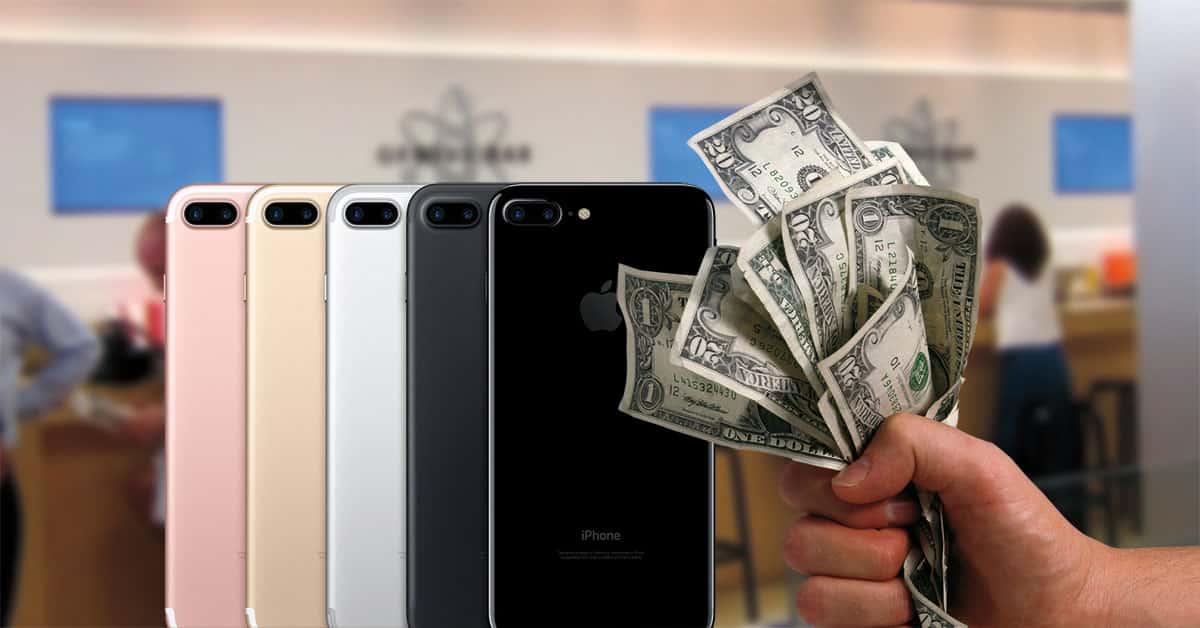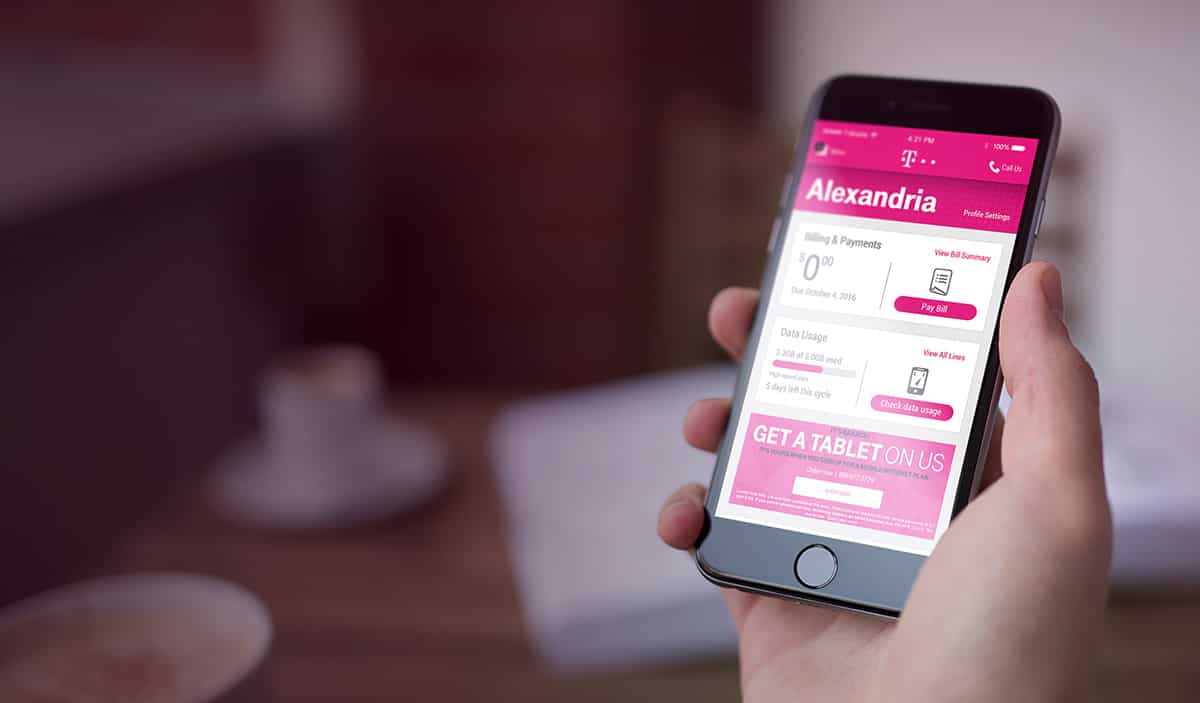T-Mobile
The magenta “Uncarrier” has long offered unique service options compared to its competitors, and that continues with the financing options for the iPhone 7. T-Mobile’s financing plan charges customers the same monthly amount for all models of iPhone 7 ($27.09) and iPhone 7 Plus ($32.09), with the difference between the capacities being a down payment ranging from $99.99 (128GB iPhone 7) to $249.99 (256GB iPhone 7 Plus). The entry-level 32GB iPhone 7 requires no down payment. This keeps your monthly bill simpler and easier to calculate, especially for those with multiple devices on a single account.
In addition to the down payment option, users with an existing iPhone can trade in their device for 24-months of bill credits, similar to AT&T and Verizon’s offerings. The iPhone 6 and 6s are worth $649.99 ($27.09 per month), making the 32GB iPhone 7 “free,” while those with an iPhone 5, 5c, 5s, or SE can get up to $399.99 ($16.66 per month) to defray some of the iPhone 7’s cost. Like the other carriers’ plans, you must remain a T-Mobile customer throughout the 24-month financing period to receive the full value of your trade-in, and if you cancel early you’ll be required to pay the balance on your iPhone 7.
In terms of upgrade plans, T-Mobile’s “Jump” and “Jump On Demand” plans offer the same basic package as those from AT&T and Verizon, but with some interesting differences. For the basic 24-month “Jump” plan, users can upgrade once 50 percent of their financed device has been paid off, while “Jump On Demand” lets customers upgrade at any time, up to three times per year, during the 18-month payment plan. Jump On Demand also waives any upgrade fees, which are normally $20 a pop.
Sprint
Rounding out the major carriers is Sprint, which offers the same basic zero-interest financing as its competitors, along with a trade-in option which equates to monthly bill credits. However, the carrier still advertises a traditional contract subsidy option. With a 2-year service agreement, customers can get the 32GB iPhone 7 for $199.99, while the highest end 256GB iPhone 7 Plus will run you $519.99.
In terms of the no-contract financing options, Sprint offers its upgradeable “lease” plans ranging from 18-months at $26.39 for the 32GB iPhone 7 ($475.02) to 17-months at $47.00 for the 256GB iPhone 7 Plus ($799.00). The trade-off with Sprint’s lease is that you get lower monthly and overall payments but you don’t get to keep the device at the end of the term (you’re expected to re-up and upgrade to the latest iPhone at that time). If you prefer keep-it-at-the-end installments, Sprint has those, too, at the same prices as T-Mobile and AT&T (ranging from $27.09 to $32.09 per month).
Finally, Sprint has matched its competitors with a limited-time trade-in offer that will credit you up to $650 over the course of a 24-month financing plan. Sprint customers interested in this offer will need to visit a Sprint store, however, to trade in their existing iPhone 6 or newer.
iPhone 7 Financing Summary
It’s clear from the overviews above that all of the carriers, with a few exceptions, offer the same basic zero-interest deals when it comes to the iPhone 7. So let’s put it all together in a handy chart to highlight the few differences, based on the 32GB iPhone 7:
| iPhone 7 32GB | ||||||||
|---|---|---|---|---|---|---|---|---|
| Apple Upgrade Program | Apple Installments | Verizon | AT&T Next | AT&T Next Every Year | T-Mobile | Sprint Subsidy | Sprint Installments | |
| Unlocked iPhone | Yes | Yes | Yes | No | No | No | No | No |
| AppleCare+ | Yes | No | No | No | No | No | No | No |
| Upgrade Terms | 6 months and 12 payments | N/A | 30 days and 12 payments | 24 payments | 12 payments | 12 payments | N/A | N/A |
| Service Contract | No | No | No | No | No | No | 2-years | No |
| No. of Payments | 24 | 24 | 24 | 30 | 24 | 24 | 1 | 24 |
| Monthly Cost | $32.41 | $27.04 | $27.08 | $21.67* | $27.09* | $27.09* | N/A | $27.09* |
| Total Cost | $777.84 | $648.96 | $649.92 | $649.99 | $649.99 | $649.99 | $199.99 | $649.99 |
With iPhone 7 financing options practically identical across the major carriers, the most important factor becomes terms and service. As long as you have decent credit and make your payments on time, you’re going to end up paying the retail price for the iPhone 7 under most plans, so the only questions are how long you want to make your payments, when you want to upgrade, and who you want to deal with.
All of the carriers will generally charge activation or upgrade fees when you bring an iPhone onto their networks, even if you buy the phone directly from Apple. Some carriers, like Sprint, are offering limited time activation fee waivers, and other carriers may waive the fees if you’re coming from another carrier or are persuasive enough. At $20 to $30 each, the amount and timing of activation fees is definitely something to consider.
A final consideration is carrier lock status of your iPhone. Both of Apple’s financing options and Verizon’s option give you an unlocked phone right out of the box, while all other iPhones will ship locked to their respective carriers. This may make it easier for you if you’re not sure which network you want to end up with when you order your iPhone 7, but customers can always unlock their iPhones down the road for resale or use on another network. Be sure to note, however, that the iPhone 7 isn’t “universal.” Unlocked iPhones ordered for AT&T and T-Mobile won’t be able to work with CDMA networks. The Verizon and Sprint models, however, are compatible with GSM networks, so be sure to plan accordingly.
Is Apple the Best Option?
With overall iPhone 7 prices pretty much the same across the board, it seems that going with one of the Apple plans is the best choice. After all, why not deal directly with a company known for good customer service instead of one from an industry notorious for terrible service? In reality, the answer may not be so simple.
Apple’s iPhone Upgrade and Installment plans are still very new, and the company is still facing growing pains related to the programs. Specifically, it seems that Apple failed to reserve enough supply to ensure that upgrade-eligible customers who signed up last year could choose their desired model when the iPhone 7 launched last week. Despite attempts by the company to address customer concerns, Apple is already facing a class action lawsuit over the issue.
While it’s easy to chalk this controversy up to high demand, a more cynical possibility is that Apple doesn’t need to ensure adequate supply at launch for its iPhone Upgrade customers, because those customers are committed to a two-year financing agreement and have no choice. Why “waste” available units on customers who are contractually obligated to keep making their monthly payments when those same iPhones could bring new customers into the fold? After all, those upgrade customers will get their iPhone 7’s eventually.
That’s not to say that this is some fiendish scheme by Apple, but the fact is that Apple has no real incentive to serve its iPhone upgrade customers while the carriers do. Therefore, you may have better luck securing your preferred iPhone model via your wireless carrier rather than Apple itself.
Another issue is the aforementioned upgrade and activation fees. Some carriers run promotions in which these fees are waived or reduced, and it’s always worth a shot to try and negotiate a waiver with the carrier’s salespeople. If you buy a phone from Apple, however, you’re definitely going to be paying those fees when you go to activate it on one of the wireless networks.
All of that said, it’s good to see a competitive iPhone 7 financing option from Apple, and hopefully the company’s management of the program gets better over time. But don’t overlook the carrier options entirely.




0% financing has several advantages over an outright purchase. They are all small though.
– While the total spent is the same, the payments toward the end of the loan are worth slightly less due to inflation.
– You can be doing other things with that $1000 that you would have spent on day one that may make you more money.
– As long as you make on time payments it’s a good way to improve your credit score, which impacts all sorts of things – job prospects, insurance rates, loan rates on other loans…
They are tiny advantages, but advantages none-the-less. If you are uncomfortable with the debt, and can do so, then by all means, pay cash.
Why using financing? None of those options give a phone any cheaper than buying it outright in the first place. Can you discuss that option, including various trade-in choices to keep the cost down? Does it fail to get any benefits from carriers? Why wouldn’t I just buy outright and if I do, what is the best way to do it?
BTW, I’m thinking of switching to a 3 year upgrade cycle because of the loss of 2-year contract subsidies. I used to upgrade every other year. I currently have an iPhone 6, so this would normally be my upgrade year. My phone is still working fine, including the battery, so I have no pressing need to upgrade.